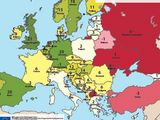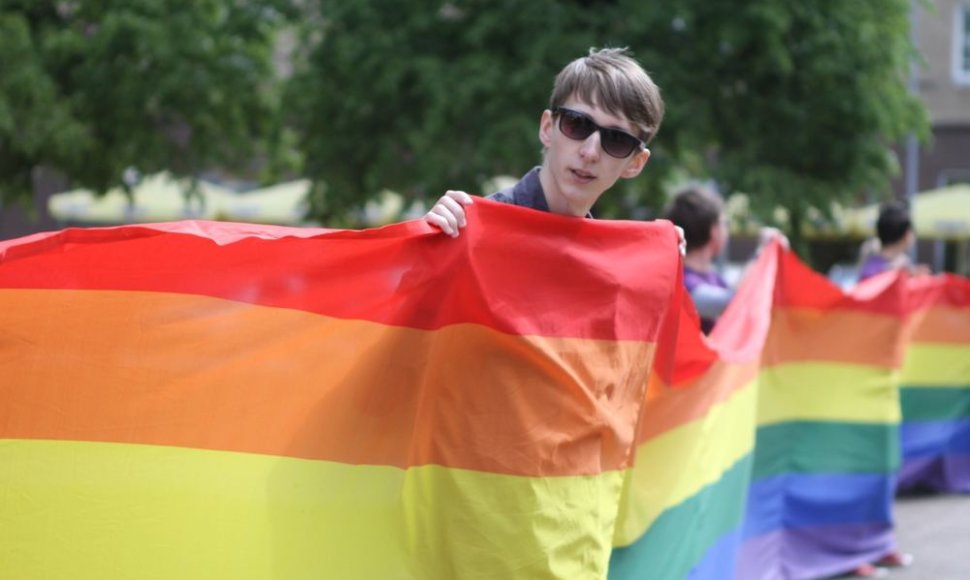The publication documents legislative, political, and social developments relevant to LGBTI people in each European country as well as international institutions. Complementing the report is the "Rainbow Map," which gives each country a numeric score reflecting its legislative and administrative practices, falling under the areas of asylum provisions, anti-discriminion laws, regulations on hate speech and hate crime, reglamentation of same-sex parnterships and family forms as well as ensuring rights of LGBTI people to free association, assembly, and expression.
The ILGA-Europe report, "Annual Review of the Human Rights Situation of Lesbian, Gay, Bisexual, Trans and Intersex People in Europe," discusses the main developments over 2011 in Lithuania, which held its first LGBT Pride in 2010 and is planning the next one in 2013.
As examples of hate speech, the report quotes an electoral slogan used by the political party Young Lithuania (Jaunoji Lietuva) during last year's municipal election campaign. The slogan read "For A Lithuania Without Blues, Blacks, Reds, and Gypsies From the Encampment." (In Lithuanian, "blue" is a slang for homosexual.)
 |
| ILGA-Europe/ILGA-Europe Rainbow Map |
"Young Lithuania explained the slogan saying, “for a Lithuania […] without blue […] the ideology of sexual perversion that is being imposed on us from abroad. Without black money and liberalist and tolerant traditions, and without red […] communist yeast that is still torturing our society.” A number of Lithuanian human rights organisations, including the Lithuanian Gay League (LGL), complained to the Prosecutor General on the grounds that the party’s homophobic and racist speech violated the country’s law regulating political parties and campaigning; however, no violation was found," ILGA-Europe reports.
The document notes that while hate speech is criminalized in Lithuania, law enforcement institutions lack resources to investigate and prosecute all cases. However, thanks to efforts by several NGOs - like the Tolerant Youth Association (TJA) which has reported many incidents of online hate speech to the prosecutors - a number of perpetrators received sentences.
"Examples include a man who was fined nearly 400 euros by the District Court of Anykščiai for urging that “all gays be slain” in an online response to an article about the first LGBT Pride Parade in Lithuania. According to TJA, 70 percent of the online hate speech cases that reach court are related to homophobic hatred and the rest are split equally between anti-Semitic and xenophobic abuse," the report reads.
It notes that Lithuania has passed anti-discrimination legislation that expressly specifies sexual orientation among grounds of discrimination banned by law. However, the report indicates that bills are pending in the Parliament which aim to outlaw "homosexual propaganda."
One more relevant legislative development is an initiative of the current conservative-dominated parliament to ammend the country's constitution to include strickter exclusion of same-sex couples from the definition of family.
"In September, Lithuania’s Constitutional Court declared that the State Family Policy, which defined families as strictly based on marriage, was unconstitutional. Article 38 of the Lithuanian Constitution states that family is the substance of society and the State, but there is no direct reference stating that family is
created only through marriage.
"In December, the Lithuanian Parliament accepted a draft amendment to the Constitution, by 62 votes to 8, which defined family in a narrowly stating that “the family is created by a free marriage agreement between a man and a woman.”
The constitutional ammendment is expected to be voted on during the current parliamentary session. In order to come into effect, it must pass two special-majority votes with a break of at least three months in between.
Another disturbing development, according to ILGA-Europe, is Lithuanian lawmakers' attempt to outlaw sex reassignment.
"In March, a group of Parliamentarians, led by the Chairman of the Committee on Health Affairs, proposed a bill outlawing gender reassignment surgery in the country. The European Court of Human Rights already ruled against Lithuania’s legislation on the subject in 2007 in the case of L v. Lithuania, stating that the absence of specific provisions regulating gender reassignment which is provided for in the Civil Code violated trans people’s rights. Supporters of the bill claim that regulations that completely ban the procedure would be compatible with the ECHR decision but LGBT human rights defenders in the country say that on the contrary such a ban directly violates human rights provisions."
In addition to challenges to Lithuanian LGBTI rights, the report notes positive eforts, like an LGBT film festival last summer, a project for empowering lesbian, bisexual, and transgender women, and an EU award to a Lithuanian journalist, Rasa Navickaitė, for covering non-traditional families and their experiences.
On the "Rainbow Map", Lithuania scored three points on the scale between 30 (best) and -12 (worst). Leading the rankings are the United Kingdom (21 points), Germany, and Spain (20 each), while Russia and Moldova fared worse (-4.5). Poland and Estonia each received 2 points and Latvia 1 point. The score does not take into account social attitudes towards LGBTI people in respective countries.












